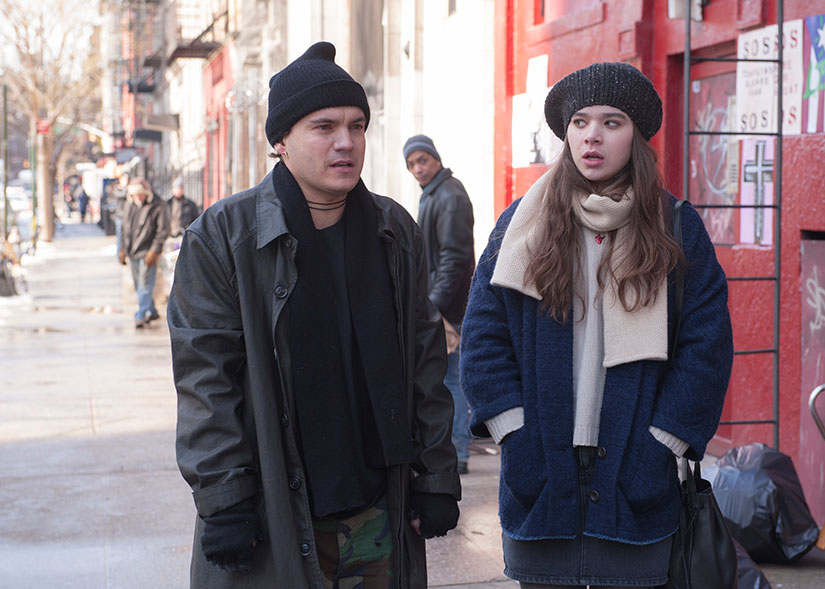I love period pieces that are a closer to contemporary time than those that are set centuries in the past, primarily because I find them easier to connect, the attitudes, culture, dress, etc. isn’t too different from modern times, and because they’re so close in time that fully imagining that world isn’t much of a stretch. The best element of period pieces, however, is the universal understanding that, no matter what decade the film takes place in, what world crises are taking place, we all share and face the same problems. Ten Thousand Saints is a succinct look at broken homes, the straight-edge movement, and how unexpected accidents could be the solutions to some of our problems.
Ten Thousand Saints
Directors: Shari Springer Berman and Robert Pulcini
Rating: N/A
Release Date: January 23, 2015 (Sundance)
The film opens in 1980 Vermont where a young Jude witnesses his mother Harriet (Julianne Nicholson) kick his father Les (Ethan Hawke) out for impregnating her best friend. Upon asking whether Les will come back, Jude is hit with the shocking revelation that he’s adopted. Fast forward to New Year’s Eve 1987, and Jude (Asa Butterfield) is an aspiring punk alongside his best friend, Teddy (Avan Jogia). Despite not visiting for years, Les sends his girlfriend’s daughter, Eliza (Hailee Steinfeld) out to Vermont to spend time with Jude as a means of connecting. Upon meeting, the three have an instant connection through their similar interests in music and drugs. During a chance encounter at a party that night, Eliza and Teddy have sex while Jude is beat up by some jocks. As Jude and Teddy part ways with Eliza, they take one final trip off of air conditioning unit fluid and pass out. The next morning, Teddy is found dead.
Reeling from the loss, Jude is reunited with Les, now a drug dealer, who offers him the chance to move to New York with him and experience real big city life. There, he reconnects with Eliza and Teddy’s older brother, Johnny, who is a singer for a rising straight-edge hardcore band (straight-edge referring to the culture of no drugs, alcohol, or promiscuous sex). It’s soon discovered that Eliza is impregnated with Teddy’s child, and rather than stir the hornet’s nest more, the three come to the conclusion to say it’s Johnny’s baby while keeping it a secret from Les and Eliza’s mother, Diana (Emily Mortimer). However, when the truth is revealed, the three of them run off to find whatever it takes to make their family dynamic work, even if one of them is harboring a secret that threatens to throw the entire group’s functionality off.
The major theme in Ten Thousand Saints is the dynamic between parent and child. Throughout the film, these bonds and connections are dysfunctional in many ways, as closely examined in the Jude and Les bond, but also seen between Eliza/Diana, Johnny and Teddy and their unseen mother, and even the crux of the film’s plot between Eliza and her unborn child. To frame these relationships amidst the rising hardcore/punk rock movement and the gentrification of Manhattan, specifically surrounding the 1988 riots in Tompkins Square Park, helps contextualize the never-ending cycle of change and growth in life with events that fall in line with the teenage memories of those who are middle-aged parents now, furthering the parental theme in the film.
Hawke shines in his supporting role as Les, channeling some similarities with his Boyhood character as a “part-time” parent who always shows up at the right moments to give wisdom or to help when absolutely needed. Both Butterfield and Steinfeld show growth in their performances, with Butterfield perhaps benefiting the most with a role that could help land him more mature roles in the future. Hirsch, not one to shy away from physically transforming himself for a role, appears a bit odd in the film, but certainly fits the mold of a straight-edge hardcore singer in late-’80s New York.
Ten Thousand Saints highlights small fragments of all of the different cultures it’s full of (young parenthood, strained parent/child relationships, 1980s New York, straight-edge/hardcore, young love, coming-of-age, etc.), but does it in a way that it never feels too overwhelming. However, the film might not appeal to those that are uninterested in such things, especially the film’s primary stage of New York.

